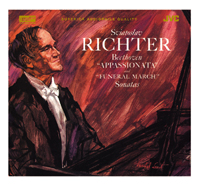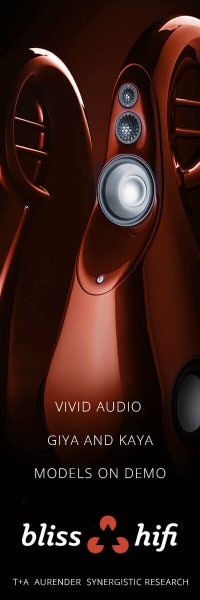Beethoven: Sonatas Op. 57, Appassionata, Op. 26, Funeral March; Sviatoslav Richter, Piano
|
Beethoven: Sonatas Op. 57, Appassionata, Op. 26, Funeral March; Sviatoslav Richter, Piano |
|
January 2005 |

The Richter one meets in Bruno Monsaingeon’s ponderous and intense film, Richter, the Enigma, is a man facing—as all who live long enough must—old age and dissolution. He is still extremely private; it was an ordeal to get his agreement to be interviewed. He is still utterly absorbed by music, still unflaggingly self-critical, the passion still burns behind his eyes. But he has become an old man. Facing Montsaingeon across a plain wooden table, the camera half-hidden, Richter reads from his (subsequently published) notebook, reflections on music and musicians, on events, and on himself. He tells of his friendship with Benjamin Britten and Oleg Kogan; the Aldeburg and Grange de Meslay festivals. He tells of the execution of his father, a German, by Beria’s NKVD during the war. He tells of how he met Nina Dorliac. He is profoundly upset that his perfect pitch has deserted him. And his final words, read from his notebook, are simply heart wrenching, “I do not like myself.” That’s it. We can only be deeply grateful that the maestro granted Monsaingeon the unique privilege of this starkly honest and intimate interview.
The Richter on this recording is a man of forty-five, internationally lionized, at the height of his powers. He has finally been given permission to travel to the United States. Artur Rubinstein has flown in from Europe to hear him play at Carnegie Hall (Richter Rediscovered, RCA 09026-63844-2). The critics are beside themselves with adulation (with the interesting exception of Harold Schonberg). Three days later, at Webster Hall in New York City, Richter recorded the two sonatas on this disc. I do not know the details of the recording session, but the fact that it was a formal recording session makes it a relatively rare event in the Richter discography. This initially excellent recording has been remastered by Japan Victor Corporation using the XRCD24 process, and the result is superb. The improvements wrought by the XRCD process, as I noted in a previous article in which I compared RCA and JVC versions of Bartok’s Concerto for Orchestra, is quite stunning. It is immediately obvious even to the non-audiophile. This is certainly one of the most realistic recordings of piano I have heard.
There were quite a number of great pianists in the Twentieth Century. There are even great pianists in the Twenty-First Century. But Richter stands alone, the purity and passion of his devotion to music, of his unique genius, obvious in every note. This was a man who said, in all modesty, just play the notes on the page. Yet he was a man able to transmit the spiritual essence of music, a man able to leap the chasm between self and other, between aesthetics and life. What a tale he might have told were he inclined to the verbal. But he was not. His comments about his music making were most often along the lines of, I played well, or, I played poorly. Neuhaus instantly recognized him, his first true genius pupil, when Richter arrived at the Moscow Conservatory at the unusually old age of 22. “He makes a nearly perfect interpretation as soon as he sees a work. I have never seen any other pianist that has wider artistic horizon than him.” But I don’t imagine Richter cared one way or the other. The music was all that ever mattered.
Someone described Richter as a sort of chameleon, taking on the hues of the music he’s performing. This is apt. I remember the first time I heard him play Grieg’s Lyric Pieces (Stradivarius STR 33353). It is the sweetest, simplest, most honest and heart felt playing of this wonderful music (I have two other versions). And this from the man I had always considered the greatest Beethoven exponent on record. It was the same with Bach’s Well Tempered Clavier. And with Schubert’s sonatas: absolute truthfulness to the music. Can you imagine a chef who is a master of every cuisine?
As for the music, I believe this is the greatest performance of the Appassionata I’ve ever heard. Richter does that, he makes one use words like greatest. He washes away considerations and preconceptions through the sheer power and truthfulness of his playing. It is particularly difficult talking about a Richter performance. I recall a Russian expert speaking of Richter in terms of a spiritual teacher. Yes. That is closer to the truth than anything I’ve said. If you buy only one Beethoven recording this year, make it this one. The Beethoven sonatas are among the supreme glories of western culture, and this CD is an ultimate expression of two of them.
Russell Lichter
![]()
Don’t forget to bookmark us! (CTRL-SHFT-D)
Stereo Times Masthead
Publisher/Founder
Clement Perry
Editor
Dave Thomas
Senior Editors
Frank Alles, Mike Girardi, Russell Lichter, Terry London, Moreno Mitchell, Paul Szabady, Bill Wells, Mike Wright, and Stephen Yan,
Current Contributors
David Abramson, Tim Barrall, Dave Allison, Ron Cook, Lewis Dardick, John Hoffman, Dan Secula, Don Shaulis, Greg Simmons, Eric Teh, Greg Voth, Richard Willie, Ed Van Winkle, Rob Dockery, Richard Doron, and Daveed Turek
Site Management Clement Perry
Ad Designer: Martin Perry





Be the first to comment on: Beethoven: Sonatas Op. 57, Appassionata, Op. 26, Funeral March; Sviatoslav Richter, Piano